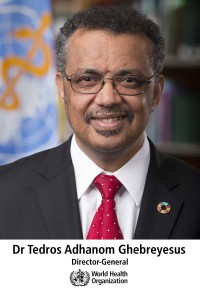
[the_ad_placement id=”adsense-in-feed”]
Geneva: With several countries around the world now experiencing fresh outbreaks of COVID-19 after a long period with little or no transmission, the World Health Organisation last night pointed out at the fact that most people remain susceptible to this virus.
 “No country can just ride this out until we have a vaccine,” it stated. However, WHO Director-General Dr. Tedros Adhanom Ghebreyesus also warned that although a vaccine will be a vital tool, “there’s no guarantee that we will (have a vaccine soon)”. He went on to caution that “even if we do have a vaccine, it won’t end the pandemic on its own”.
“No country can just ride this out until we have a vaccine,” it stated. However, WHO Director-General Dr. Tedros Adhanom Ghebreyesus also warned that although a vaccine will be a vital tool, “there’s no guarantee that we will (have a vaccine soon)”. He went on to caution that “even if we do have a vaccine, it won’t end the pandemic on its own”.
“We must all learn to control and manage this virus using the tools we have now, and to make the adjustments to our daily lives that are needed to keep ourselves and each other safe,” Dr. Ghebreyesus asserted and further stressed that it was vital that countries were able to quickly identify and prevent clusters, to prevent community transmission and the possibility of new restrictions.
[the_ad_placement id=”content-placement-after-3rd-paragraph”]
While pointing out at the figures — globally, there are now more than 22 million reported cases of COVID-19, and 780,000 deaths — the WHO stated in many countries the number of patients who needed hospitalization and advanced care remained high, putting huge pressure on health systems and affecting the provision of services for other health needs.
“But it was not just the numbers of cases and deaths that matters, Dr. Ghebreyesus said while making a point that it was high time that every person and family understood the level of transmission locally, and what they could do to protect themselves and others.
“Every single person must be involved. Every single person can make a difference. Every person, family, community and nation must make their own decisions, based on the level of risk where they live,” he said. According to him while lock-downs enabled many countries to suppress transmission and take the pressure off their health systems, they could not be a long-term solution for any country.
“We do not need to choose between lives and livelihoods, or between health and the economy. That’s a false choice. On the contrary, the pandemic is a reminder that health and the economy are inseparable. WHO is committed to working with all countries to move into a new stage of opening their economies, societies, schools and businesses safely, he said.
Reiterating that the world had had now changed and one could not go back to the way things were, Dr. Ghebreyesus said hardship was always an opportunity to learn, to grow and to change.
“Throughout history, outbreaks and pandemics have changed economies and societies. This one will be no different,” he said and reflected that while COVID-19 was a once-in-a-century health crisis, it also gave the world “a once-in-a-century opportunity to shape the world our children will inherit – the word we want”.
“In particular, the pandemic has given new impetus to the need to accelerate efforts to respond to climate change. The pandemic has given us a glimpse of our world as it could be: cleaner skies and rivers. Building back better means building back greener.”
In view of what Dr. Ghebreyesus said, it may be recalled that in May, WHO had published “Manifesto for a Healthy and Green Recovery”, with 6 policy prescriptions for protecting nature, investing in water and sanitation, promoting healthy food systems, transitioning to renewable energy, building liveable cities, and stopping subsidies on fossil fuels.
“In July we added ‘actionables’ for each of these policy prescriptions, providing 81 concrete steps for policy-makers to build a healthier, fairer, greener world. Since then, over 40 million health professionals from 90 countries have sent a letter to G20 leaders to call for a Healthy Recovery from COVID-19. And we have seen many examples of countries acting to protect lives, livelihoods and the planet on which they depend,” he informed. He also highlighted the following initiatives taken by countries in this direction:
- Nairobi, Kenya is improving parks, adding urban forests, building more sidewalks and improving drainage.
- Pakistan has set up a “green stimulus” scheme, offering labourers who are out of work as a result of lockdown a chance to earn money by planting trees.
- In the United Kingdom, the use of coal, the most polluting form of energy, fell to its lowest level in 250 years.
- Spain is becoming one of the world’s fastest decarbonizing nations, with 7 of the country’s 15 coal-fired power stations recently closed.
- Portugal has announced it will become coal-free by next year.
- Chile has committed to reducing air pollution and black carbon.
- Great cities such as Paris have committed to becoming “15 minute cities”, where every service can be easily reached by foot or bike, reducing air pollution and climate change.
Dr. Ghebreyesus also referred to a group called Long COVID SOS, representing patients with long-term effects from COVID-19 infection. Based on his interaction with the group, he said these patients wanted recognition of their disease, appropriate rehabilitation services and more research to be done into the long-term effects of this new illness.
“Although we have learned so much about this disease, we only have less than 8 months of experience to draw on. We still know relatively little about the long-term effects. My message to these patients was: we hear you loud and clear, and we are committed to working with countries to ensure you receive the services you need, and to advancing research to serve you better,” he said.
[the_ad_placement id=”sidebar-feed”]





